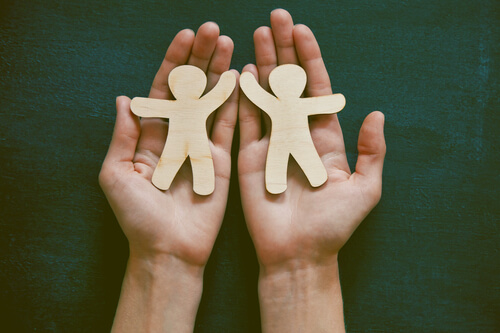Prosocial Behavior: What It Is and How It Develops


Written and verified by the psychologist Elena Sanz
Every day, you make many decisions that confront you with the dilemma of either thinking about yourself or others. At first glance, prosocial behavior and selfish behavior seem to be diametrically opposed, but do you really forget about your own needs to satisfy those of others? What personal and cultural factors lead you to act in this way?
It’s been discovered that human beings are the only animals that display cooperative behavior with individuals with whom we’re not closely related. In the rest of the animal kingdom, kinship and reciprocity constitute the limits of positive behavior directed toward others. Therefore, we might say that biology fails to fully account for our prosocial tendency. In fact, it’s our culture that takes over in this task.

Prosocial behavior
Prosocial behavior can be defined as any behavior that benefits others or has positive social consequences. Solidarity, cooperation, helping others, altruism… they’re all examples of this broad term.
In a colloquial way, we might say that we exhibit prosocial behavior when we do something for someone else. These types of actions are essential to establish and maintain social relationships since they facilitate positive interactions with others.
Prosocial behavior is the antithesis of antisocial behaviors. We understand the latter as acts of violence, intolerance, and indifference to others and the environment. Nevertheless, what determines our personal inclination toward one side or the other?
Prosocial behavior and personality
It’s been discovered that there’s a relationship between certain personality traits and the greater tendency to emit prosocial behaviors :
- Self-concept. This term refers to the perception, opinion, and beliefs that you have about yourself. The assessment you make of yourself seems to be directly related to your performance of prosocial behaviors and, inversely, with antisocial behaviors. Therefore, those who have healthier and more solid self-esteem are more likely to help others.
- Impulsivity. Impulsive people tend to react quickly and reactively without thinking of the consequences. Their impulsivity decreases the probability of them carrying out prosocial behaviors since they don’t think before they act.
- Empathy. This is the ability to put yourself in another’s shoes, and understand their feelings and perceptions. The most empathetic people are those who frequently carry out prosocial behaviors. That’s because of their sensitivity in capturing the emotional states of others.

Learning and culture
Beyond the biological component that predisposes us to cooperate with others in certain circumstances, it’s learning and culture that complete this equation.
First, we know that any behavior that’s followed by reinforcement tends to increase in frequency. In the case of prosocial behaviors, the reinforcement we receive when emitting them is of a social nature. For example, a thank you, a smile, the recognition of others, etc.
We could say, therefore, that even in altruism (the highest moral behavior), the person who executes it also receives some kind of benefit. As a matter of fact, if it only involved costs for the individual, it wouldn’t have lasted over time.
On the other hand, socialization models play a fundamental role in the development of prosocial behaviors. During childhood, we observe and imitate the behavior of those around us. Furthermore, we acquire information about which behaviors are desirable and which aren’t.
The values transmitted during this vital stage will be decisive. However, even in adulthood, being exposed to certain models can lead us to adopt more prosocial habits. One example can be found in the greater environmental awareness that many people have developed in recent times.
In short, prosocial behaviors have great value for life in society and for individual well-being. Therefore, we must encourage empathy, self-esteem, and self-control in children. In addition, as adults, we must show more of these actions in our daily lives. Indeed, taking an interest in each other is beneficial for everyone involved.
Every day, you make many decisions that confront you with the dilemma of either thinking about yourself or others. At first glance, prosocial behavior and selfish behavior seem to be diametrically opposed, but do you really forget about your own needs to satisfy those of others? What personal and cultural factors lead you to act in this way?
It’s been discovered that human beings are the only animals that display cooperative behavior with individuals with whom we’re not closely related. In the rest of the animal kingdom, kinship and reciprocity constitute the limits of positive behavior directed toward others. Therefore, we might say that biology fails to fully account for our prosocial tendency. In fact, it’s our culture that takes over in this task.

Prosocial behavior
Prosocial behavior can be defined as any behavior that benefits others or has positive social consequences. Solidarity, cooperation, helping others, altruism… they’re all examples of this broad term.
In a colloquial way, we might say that we exhibit prosocial behavior when we do something for someone else. These types of actions are essential to establish and maintain social relationships since they facilitate positive interactions with others.
Prosocial behavior is the antithesis of antisocial behaviors. We understand the latter as acts of violence, intolerance, and indifference to others and the environment. Nevertheless, what determines our personal inclination toward one side or the other?
Prosocial behavior and personality
It’s been discovered that there’s a relationship between certain personality traits and the greater tendency to emit prosocial behaviors :
- Self-concept. This term refers to the perception, opinion, and beliefs that you have about yourself. The assessment you make of yourself seems to be directly related to your performance of prosocial behaviors and, inversely, with antisocial behaviors. Therefore, those who have healthier and more solid self-esteem are more likely to help others.
- Impulsivity. Impulsive people tend to react quickly and reactively without thinking of the consequences. Their impulsivity decreases the probability of them carrying out prosocial behaviors since they don’t think before they act.
- Empathy. This is the ability to put yourself in another’s shoes, and understand their feelings and perceptions. The most empathetic people are those who frequently carry out prosocial behaviors. That’s because of their sensitivity in capturing the emotional states of others.

Learning and culture
Beyond the biological component that predisposes us to cooperate with others in certain circumstances, it’s learning and culture that complete this equation.
First, we know that any behavior that’s followed by reinforcement tends to increase in frequency. In the case of prosocial behaviors, the reinforcement we receive when emitting them is of a social nature. For example, a thank you, a smile, the recognition of others, etc.
We could say, therefore, that even in altruism (the highest moral behavior), the person who executes it also receives some kind of benefit. As a matter of fact, if it only involved costs for the individual, it wouldn’t have lasted over time.
On the other hand, socialization models play a fundamental role in the development of prosocial behaviors. During childhood, we observe and imitate the behavior of those around us. Furthermore, we acquire information about which behaviors are desirable and which aren’t.
The values transmitted during this vital stage will be decisive. However, even in adulthood, being exposed to certain models can lead us to adopt more prosocial habits. One example can be found in the greater environmental awareness that many people have developed in recent times.
In short, prosocial behaviors have great value for life in society and for individual well-being. Therefore, we must encourage empathy, self-esteem, and self-control in children. In addition, as adults, we must show more of these actions in our daily lives. Indeed, taking an interest in each other is beneficial for everyone involved.
All cited sources were thoroughly reviewed by our team to ensure their quality, reliability, currency, and validity. The bibliography of this article was considered reliable and of academic or scientific accuracy.
- Calvo, A. J., González, R., & Martorell, M. C. (2001). Variables relacionadas con la conducta prosocial en la infancia y adolescencia: personalidad, autoconcepto y género. Infancia y aprendizaje, 24(1), 95-111.
- Moñivas, A. (1996). La conducta prosocial. Cuadernos de trabajo social, 9(9), 125-142.
This text is provided for informational purposes only and does not replace consultation with a professional. If in doubt, consult your specialist.







